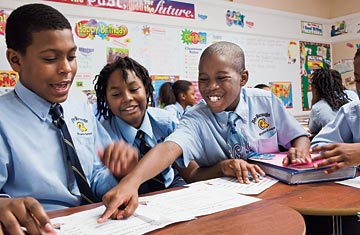
From left: Rodney Thomas, Tyreke Johnson and Malik Harris, at Burroughs Education Center in Washington, look at their payment vouchers
(7 of 9)
Meanwhile, in Washington, each school got to choose three of the payment metrics, and some of the elements ended up being outcomes like test scores. But the students were also paid on the basis of attendance and behavior--two actions that are under their direct control. Under this hybrid model, the kids who got paid did better on their standardized reading tests. Because of the small size of the school system, the Washington sample was less well balanced than those in the other cities. But its results contain one remarkable finding: the kids who were helped the most by the experiment were the ones who are normally among the hardest to reach. "The typical reform helps girls more than it helps boys," Fryer says. "[This] is the opposite. In D.C., all the results are being driven by the boys. That's fascinating."
When I talked with Washington students, teachers and principals about the experiment, they appeared to have very low expectations for its long-term impact. Many of them, speaking from experience, seemed to think that nothing as simple as money could reach a certain hard core of kids. "The children we had challenges with before, we still have challenges with," says Vealetta Moore-Parker, a guidance counselor who runs the incentives program at Burroughs Education Campus.
Nevertheless, according to Fryer's results, kids with a history of serious behavioral problems saw the biggest gains in test scores overall. Their reading scores shot up 0.4 standard deviations, which is roughly the equivalent of five additional months of schooling.
Kids may respond better to rewards for specific actions because there is less risk of failure. They can control their attendance; they cannot necessarily control their test scores. The key, then, may be to teach kids to control more overall--to encourage them to act as if they can indeed control everything, and reward that effort above and beyond the actual outcome.
The Knowledge Is Power Program (KIPP), one of the most successful charter-school networks in the U.S., has been doling out financial incentives for 15 years, using a model that happens to align perfectly with the results of Fryer's study. KIPP students get paid for actions they can control--getting to school on time, participating in class and having a positive attitude--with "money" they can redeem for supplies at the school store. Over the years, KIPP leaders, who now run 82 schools nationwide, have learned a lot about which rewards work and which do not. They have found that speed matters, for example. Recognition, like punishment, works best if it happens quickly. So KIPP schools pay their kids every week. (Interestingly, the two places Fryer's experiment worked best were the ones where kids got feedback fast--through biweekly paychecks in Washington and through passing computerized quizzes in Dallas.)
